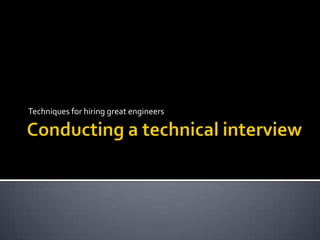Oct. 25. 2011 webcast conduct aninterview
- 1. Techniques for hiring great engineers
- 2. Elecia White Logical Elegance 2
- 3. Elecia White Logical Elegance 3
- 4. Elecia White Logical Elegance 4
- 5. Elecia White Logical Elegance 5
- 6. Scientific thought Personality Skill Good hire Elecia White Logical Elegance 6
- 7. Strategy Tactics Elecia White Logical Elegance 7
- 8. Elecia White Logical Elegance 8
- 9. Elecia White Logical Elegance 9
- 10. Elecia White Logical Elegance 10
- 11. ’éĪ Can she do the job? ’éĪ Can you work with her? Elecia White Logical Elegance 11
- 12. ŌĆ” Elecia White Logical Elegance 12
- 13. ’éĪ Title VII prohibits employment discrimination based on race, color, religion, sex, or national origin; ’éĪ EPA protects men and women who perform substantially equal work in the same establishment from sex-based wage discrimination; ’éĪ ADEA which protects individuals who are 40 years of age or older; ’éĪ ADA prohibits employment discrimination against qualified individuals with disabilities in the private sector, and in state and local governments; ’éĪ GINA prohibits employment discrimination based on genetic information about an applicant, employee, or former employee; and ’éĪ The Civil Rights Act of 1991 (among other things) provides monetary damages in cases of intentional employment discrimination. http://www.eeoc.gov/facts/qanda.html Elecia White Logical Elegance 13
- 14. Elecia White Logical Elegance 14
- 15. Elecia White Logical Elegance 15
- 16. Elecia White Logical Elegance 16
- 17. Elecia White Logical Elegance 17
- 18. Elecia White Logical Elegance 18
- 19. 0-3 ŌĆó Small talk (refreshment, break, etc.) 3-8 ŌĆó Short technical question 8-13 ŌĆó Interpersonal question 13-22 ŌĆó Long technical question 22-27 ŌĆó Questions from the interviewee 27-30 ŌĆó Short question based on resume Elecia White Logical Elegance 19
- 20. Elecia White Logical Elegance 20
- 21. Elecia White Logical Elegance 21
- 22. 1. I will immediately tender my resignation if you offer this person a job. 2. Extremely weak candidate. This person is likely to be a long-term drain on resources, and may well never make the transition to being a net positive contributor. 3. Weak candidate. Initially, this candidate will be a net loss, requiring training, mentoring, constant guidance and close supervision. They may grow in time, and become a net contributor, but it is not clear when (or if) this will occur. 4. Mediocre candidate: This person demonstrated some obvious deficiencies in the course of the interview, although they were not a complete train wreck. 5. Fair candidate: This person showed no particular brilliance, but no glaring deficiencies either. They will require support and assistance, but it is reasonable to expect that they will become a useful if uninspired contributor in time. 6. Reasonable candidate: This person seems like they may become a valuable team member, after some start-up delay. 7. Strong candidate: This person is likely to become a valuable member of the team fairly quickly. 8. This is an extremely strong candidate. While not a rock star, they have an impressive breadth and depth of knowledge, and will come up to speed very quickly. Unless there is a rock star candidate in the line-up, we should very strongly consider making this person an offer. 9. This person is a rock star. They will make an immediate and valuable contribution to the company, and we are unlikely to find a better fit for this job than this candidate. 10. I will immediately tender my resignation if you do not offer this person a job. (Taken from Phil King at http://weekendengineering.blogspot.com/.) Elecia White Logical Elegance 22
- 23. Elecia White My book: Making Embedded Systems Twitter: @logicalelegance My company: http://www.logicalelegance.com/ Elecia White Logical Elegance 23
- 24. Elecia White Logical Elegance 24
- 25. SPECIAL OFFER Visit http://oreilly.com to purchase your copy of Making Embedded Systems and enter code 4CAST to save 40% off print book & 50% off ebook with special code 4CAST Visit http://oreilly.com/webcasts to view upcoming webcasts and online events.

























